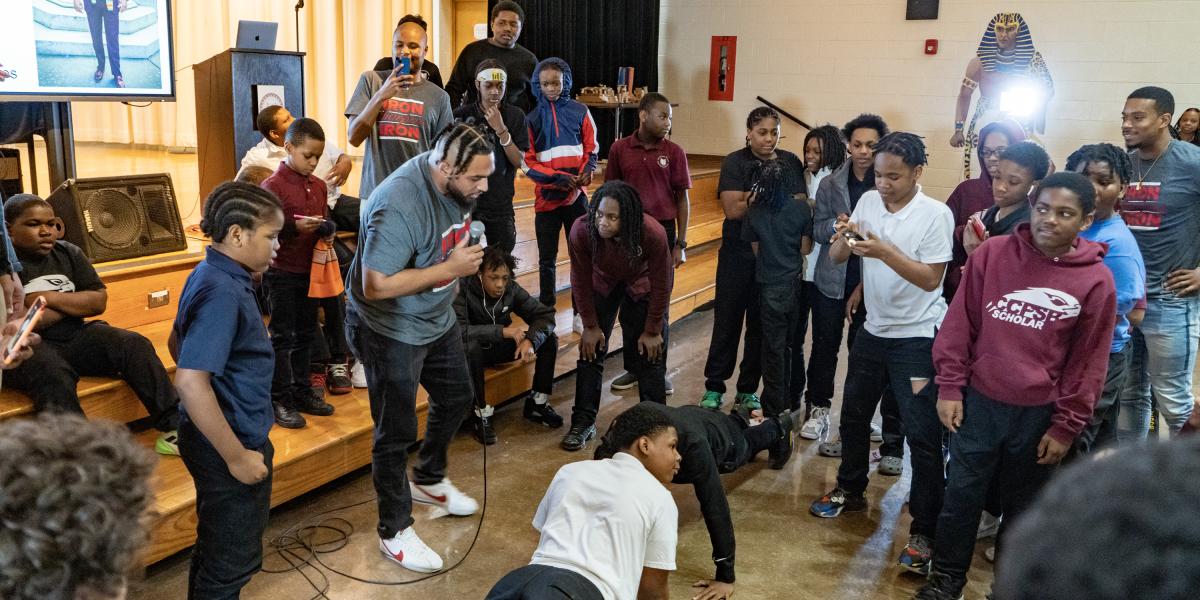Geoff Green takes a $5 bill out of his pocket. He wads it up, stomps on it, crumbles it up and punts it dramatically off the auditorium stage toward the audience of middle schoolers gathered for an assembly at the Columbus City Preparatory School for Boys.
"Life is going to step on us, crush us, crinkle us, and kick us," said Green, a 2017 neuroscience graduate and current PhD candidate, as he hands off the mutilated Abe Lincoln to a young man down front. "But you know what? We don't lose our value."
A few minutes later, a blindfolded eighth-grader attempts to walk across a school auditorium stage as a friend--tagged the "the voice of reason" by Green--tries verbally to direct him as the teenagers in the audience scream at the top of their lungs.
With the student turning helplessly in circles, Green ends the demonstration and quiets the crowd. "What could you hear?" Green asks the blindfolded student. "Man, I couldn't hear nothing," says the student.
"That's exactly what we do every single morning when we pick up our phones and let all of these voices on social media into our heads," said Green. "When we wake up is when our brain is the most malleable. We need to stop for a minute in the morning and be intentional about what we're putting in our heads."
This isn't your usual school assembly. Employing skits, role-playing, self-help messaging as well as deeply personal stories of hardship and perseverance, the special guest speakers that day--Green, Maurice Lathan Jr., and Timothy Hinton--fight for the attention of the fidgety teenagers decked out in maroon school polos.
The trio of twenty-something Ohio State graduates met through the Bell National Resource Center, an ODI program focused on creating a sense of community and connectedness for Black males to ensure success at The Ohio State University and beyond. The BNRC's motto--"Iron Sharpens Iron"--is central to the program's ethos that Black men can help one another to prosper. And it's that philosophy that draws the young Buckeye graduates to the Columbus public charter school where most of the students are Black and many come from single-parent homes.
"I think it's 100 percent the message that BNRC has pretty much drilled into us about building that village and community and always looking out for one another," said Lathan.
"We are trying to change all of these students' lives," said Timothy Hinton, a 2021 psychology graduate with a master's in clinical health counseling, after the assembly breaks up. "They are going through challenging times, and we want to make sure they hear a voice of power to make sure that they know they are valuable, their life is meaningful, and they can do something great with it."
When Hinton takes the stage to talk to the students, he leads them in a chant of "I am the key" before telling them about the feelings of anger, confusion, and depression that haunted him when he was growing up in Sandusky. "Your current condition is not my conclusion. What I go through, I can grow though," he tells the students. He challenges the students to find friends and mentors who will support them as they reach for their dreams. "I had to go find my village," he said. "I had to seek out people who wanted to help me rise--people who would pour into me, not tear me down."
The BNRC's relationship with Columbus Prep extends well beyond the special assembly this March afternoon. The public charter school on Columbus' East Side, which serves about 150 young men with reading and math testing scores that rank in the middle of the pack among Columbus' schools, is where BNRC students have held regular Scholars Lounge study table sessions as well as small group mentoring sessions with students. And the school's current principal, Tai Cornute, is himself a former BNRC program coordinator.
During his time at Ohio State, Lathan volunteered at the school as part of the BNRC partnership and said the learning that took place was a two-way street. "Honestly, the kids taught me more than I taught them. I think the kids needed men in their life who are going to be in their life and show up," said the 2020 health and rehabilitative sciences graduate. "Once they got that, they started to open up and started building that rapport with them. To me, it was a reminder that no matter how far I go, you always got to reach back and pull somebody else up."
The idea to bring together some of his BNRC brothers for motivational speaking came from Hinton, who said he has long wanted to put together a "pay forward" project aimed at helping young people. "We're just trying to uplift and pour into these youth," he said. "Some of them carry self-doubt, so we want them to see people doing big things who have a community behind them like we do in the BNRC."
After the bell rings to end the school day, Principal Cornute circles back to the auditorium to thank the BNRC crew for speaking with his students. He says the presentation from the young graduates grabbed his young men. "They did a phenomenal job with the presentation to hold their attention," he said. "I had scholars coming up to me at dismissal and saying, 'This was it' and shaking my hand and just proud to have been in the audience and heard what they are saying."
Cornute said it's a full circle moment for him to see Green, Hinton, and Lathan taking the time to help young people. "I remember when they were coming in as freshmen and helping to shape and mold them by being a resource and a guide," he said. "So for them to come back in this capacity, it just means the world to me."
